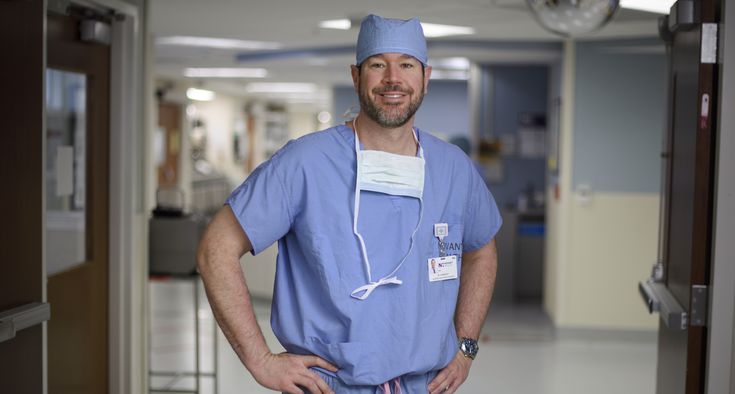For these professionals, the comforting cliche “it’s not brain surgery” doesn’t apply. It is brain surgery. Or spine surgery, where the stakes are just as high.
Neurosurgeons at Novant Health face life-changing consequences for their patients every time they step into the operating room. It’s a level of stress many of us don’t experience at work. Here, three neurosurgeons share how they keep their cool under some of the most intense pressure imaginable.
Advanced care for brain, spinal and nerve conditions.
Mental rehearsing

In high school, Dr. Kelly Wackerle learned that visualizing plays and drills off the basketball and volleyball court helped her perform better on the court.
This technique is called "mental rehearsing," and Olympic athletes use it to improve their performance. It also helps Wackerle, a neurosurgeon at Novant Health Spine Specialists - Randolph Road, be ready for operations.
"When I'm at a workout class, I'm rehearsing surgeries in my head. As I'm falling asleep, I'm rehearsing," Wackerle said. "That mental rehearsing is important to perfecting a hands-on skill."
Another preparation technique Wackerle uses: When needed, she talks about the case with her colleagues.
"There's often more than one way to correct a spinal problem," Wackerle said. "Even surgeons who have been in practice for many years will reach out to their colleagues to get expert consensus on a plan."
Even with the best-laid plan, "Sometimes, you essentially have to get out of trouble in the operating room," Wackerle said. "During their career, every surgeon will encounter either a complication or something that doesn't go as planned."
She deals with this possibility by reminding herself: Trust your (extensive!) training. "There are so many cases where you can think to yourself, 'I've seen that before. I know how to fix that,'" Wackerle said. "The key to staying calm is knowing that I put in that many hours in training to be able to manage this."
That’s not to say she’s thinking about surgery every moment of every day.
“It’s really important to maintain some sort of work-life balance — still be a good mother to my son, a good wife, a good daughter and enjoy my family," Wackerle said. "Anytime I'm spending time with my son, work goes to the back of my mind — watching him smile, say ‘Mama,’ or read his favorite book — those moments really take my mind off the stressful parts of work."
Have a plan A, B, C and D

Like Wackerle, Dr. Elizabeth Kuhn was an athlete in school, starting as a competitive swimmer and later a triathlete. The neurosurgeon with Novant Health Brain & Spine Surgery - Kimel Park in Winston-Salem said when she competed, she worked to focus on what was within her control, recognize what wasn’t and know she was well-prepared to handle whatever came up.
Similar principles applied in medical school. Kuhn learned how to cultivate a sense of calm when exposed to complex and emergency situations. Her mentors modeled how to react. She refined the skill during her residency and early career, building confidence in her abilities over time. Now, she said, “I have my plan A, B, C and D for each surgery, so if plan A fails based on what I find during the procedure, I go to the next option.”
She clicks into a different mindset once she enters the operating room and sees the patient in sterile drapes. Her focus is on the technical skills to treat the patient and lead her medical team. Once she meets with the patient post-surgery, she lets herself feel an emotional connection again and recognize what this procedure means to the patient, family and friends.
It’s become popular for surgeons to have coaches or performance psychologists, Kuhn said. She works with a therapist to maintain resilience in a challenging job and uses techniques such as deep breathing to feel centered. She also finds that health basics — including sound sleep, good diet and regular exercise — make a difference in her equilibrium.
How are neurosurgeons different from other people? Kuhn argues they aren’t. “Yes, our job is very high-stakes, but so is driving your car on the interstate while your kids are screaming in the back seat,” she said. Keeping calm, she said, is a skill that surgeons develop and other people can, too.
Take a breath and work quickly

Dr. Ziad Hage wasn’t a naturally calm kid. “I had to work on it,” said Hage, a neurosurgeon with Novant Health Brain & Spine Surgery - Cotswold in Charlotte. “I’m pretty energetic and active.”
Hage grew up in Lebanon during wartime. When warnings came that bombings were imminent and people rushed to shelters, he recalls responding as a teen “just like anybody else,” with an accelerated heart rate and a feeling of panic. He compares the ability to stay calm in surgery to a muscle he developed and trained.
As one example, Hage cites a complication that all neurosurgeons dread, a rupture of a brain aneurysm. An aneurysm is a bulge or bubble on a blood vessel, sometimes paper thin. During surgery, when the surgeon gently peels away layers of the brain to get a better look at the aneurysm and identify treatment options, it can rupture despite the surgeon’s best efforts.
“What you see is a massive gush of blood,” Hage said. “Now all bets are off, because those vessels can bleed very, very fast. The patient can lose a liter of blood in the span of three to four minutes.”
In a situation like this one, Hage takes a deep breath and slows his speech to compose himself and be clear about next steps. The surgical team prepares for contingencies in advance and is ready to follow his lead in an instant. The goal is to remain calm while working fast and efficiently.
Hage's foundation is prayer, which he calls his version of meditation. A Catholic, he prays each morning and night and before each surgery. "I'm just asking God to put His power into my hands,” he said, “and allow me to do the surgery the best way I can and offer the patient the best possible outcome."











